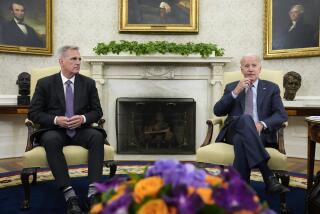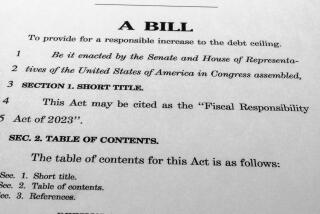Ethics Committee Rejects Gingrich’s Plan for Dole Loan
- Share via
WASHINGTON — The House Ethics Committee on Thursday night rejected House Speaker Newt Gingrich’s $300,000 loan agreement with 1996 Republican presidential nominee Bob Dole and imposed instead a far more stringent arrangement that required Gingrich to pay $50,000 from personal funds immediately and sliced the Dole loan in half.
Responding to criticism that the Gingrich-Dole arrangement was a “sweetheart deal” between two veteran politicians, the committee struck a deal with Gingrich that would settle his $300,000 penalty for ethics violations while conforming more closely to commercial banking standards. In the new arrangement--agreed on by Gingrich and the ethics panel Thursday--Gingrich must put up his home as partial collateral and make more frequent payments than he originally had proposed.
Instead of postponing payments on the Dole loan until 2005, as the original deal would have allowed, Gingrich will be forced to make two more payments to the House of $50,000 each, in June 1998 and November 1998, and pay the remaining $150,000 on Jan. 2, 1999. On Thursday afternoon, Gingrich delivered to the committee a check for $50,000.
But the deal also contains an element that is sure to generate another round of criticism. It allows Gingrich to use proceeds from a book deal with HarperCollins Publishers Inc. as additional collateral for the $150,000 loan from Dole.
Details of the new book arrangement were not available. But in 1994, as the incoming speaker, Gingrich faced a storm of criticism over a $4.5-million advance for a different book from the same publisher. Democrats condemned the arrangement as a “sweetheart deal” and pointed out that HarperCollins is controlled by communications mogul Rupert Murdoch, who had policy issues before Congress and had met privately with Gingrich before the book deal was announced. Gingrich ultimately gave up the advance, accepting instead $1 and book sale royalties.
J. Randolph Evans, Gingrich’s attorney, said in a letter to the Ethics Committee agreeing to the new conditions that both Gingrich and Dole had been “subject to a constant barrage of attacks which have been unfounded and destructive.”
Thursday night Gingrich was portraying the new arrangement as something to which he readily agreed to to silence critics of the previous deal. “Newt wanted to do it in a way that ended it instead of creating a series of new issues,” said Rich Galen, a longtime associate of the Georgia Republican.
But others said that California Rep. Howard L. Berman (D-Mission Hills), half of the two-member Ethics Committee, would not go along with details of Gingrich’s original proposal. In negotiations with Evans, Berman and the panel’s chairman, Rep. James V. Hansen (R-Utah), agreed to the new conditions. (The panel, which usually has five members from each party, is in transition as it undergoes an overhaul prompted by the Gingrich ethics case.)
“The committee finds the proposed payment schedule, which calls for total payment within this term of Congress, reasonable and appropriate and in conformance with House rules and standards,” Hansen and Berman wrote.
One concern among critics of Gingrich’s original proposal was that it violated a 1995 congressional gift ban, allowing lawmakers to receive bank loans only if the terms are comparable to those generally available to the public.
As for personal loans, the gift ban does not permit them at all--unless they are specifically approved by the ethics panel. While the Ethics Committee already had endorsed the concept of Gingrich paying his penalty with a personal loan, it had never given its OK to the specifics of Gingrich’s surprise deal with former Senate Majority Leader Dole.
When the Gingrich-Dole deal was announced in April, Gingrich’s aides had expressed confidence that it would pass muster in the ethics panel. But criticism of the arrangement was swift--mostly from Democrats but also from some Republicans concerned that the public might view the arrangement as two veteran politicians scratching each other’s backs.
As part of the new arrangement, Dole submitted to the ethics panel a letter promising that he would not “directly or indirectly contact Speaker Gingrich on behalf of any clients” of Verner, Liipfert, Bernhard, McPherson & Hand--the Washington law firm he recently joined.
Dole also promised that he would not register as a lobbyist and that, if he ever did, the personal loan would be converted to a commercial bank loan.
Gingrich’s ethics problems have torn at the House for more than a year. His $300,000 penalty stemmed from his admission last fall that he had violated House rules by submitting false statements to the Ethics Committee, which was investigating the tax-exempt status of a college course he had taught.
Gingrich then struck the legislative equivalent of a plea bargain, admitting that he had failed to seek proper legal advice and had sent erroneous information to the committee. He agreed to the panel’s penalty--$300,000--to repay the House for the cost of its investigation.
When he announced his arrangement with Dole, Gingrich stressed that he was not paying a fine but rather reimbursing taxpayers $300,000.
For months, Gingrich struggled with the most cost-effective and politically acceptable way of paying off the $300,000.
He considered several options: paying with leftover campaign funds, establishing a legal defense fund, going to court to compel his law firm to pay and paying out of his own funds. Gingrich, who earns $171,500 annually as speaker, said that his wife had objected to the use of their personal funds, fearing that it would cripple the family’s future financial security.
As Gingrich wrestled with the decision, some of his closest allies had pressed him to pay the money himself, fearing that any effort to avoid personal responsibility would keep the long ethics saga alive and cause negative reaction among voters.
It was Dole who suggested that he loan Gingrich the money.
More to Read
Sign up for our Book Club newsletter
Get the latest news, events and more from the Los Angeles Times Book Club, and help us get L.A. reading and talking.
You may occasionally receive promotional content from the Los Angeles Times.










